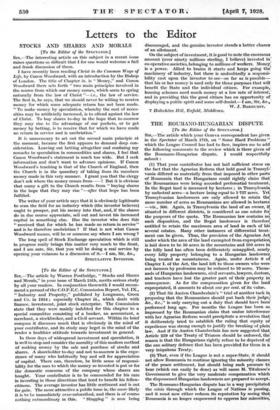Letters to the Editor
STOCKS AND SHARES AND MORALS
[To the Editor of the SPECTATOR.] SIR,—The interesting article on this subject in a recent issue raises questions so difficult that I for one would welcome a full and frank discussion of them.
I have recently been reading Christ in the Common Ways of Life, by Canon Woodward, with an introduction by the Bishop of London. The title of Chapter ix. is " Money," and Canon Woodward there sets forth " two main principles involved in the source from which our money comes, which seem to spring naturally from the law of Christ "—i.e., the law of service. The first is, he says, that we should never be willing to receive money for which some adequate return has not been made. " To make money by speculation, whereby the cost of neces- sities may be artificially increased, is to offend against the law of Christ. To buy shares to-day in the hope that to-morrow they may rise to the advantage of our pockets, or to get money by betting, is to receive that for which we have made no return in service and is unchristian."
It is unnecessary to set out the second main principle at the moment, because the first appears to demand deep con- sideration. Leaving out betting altogether and confining my remarks to speculation in commodities and shares, I feel that Canon Woodward's statement is much too wide. But I seek information and don't want to advance opinions. If Canon Woodward's teaching is that of the Church of England, then the Church is in the quandary of taking from its members money made in this very manner. I grant you that the clergy don't ask where the money comes from ! But it is obvious that many a gift to the Church results from " buying shares in the hope that they may rise "—after that hope has been fulfilled.
The writer of your article says that it is obviously legitimate to scan the field for an industry which (the investor believes) ought to prosper, put his money into that, and, if the shares do in due course appreciate, sell out and invest his increased capital in something else. Has the investor who does this " received that for which he has made no return in service" and is he therefore unchristian ? If that is not what Canon Woodward means, will he or someone say where I am wrong ?
The long spell of Stock Exchange speculation which is still in progress really brings this matter very much to the front, and I am sure, Sir, that you will be doing a real service by opening your columns to a discussion of it.—I am, Sir, &c.,
SPECULATIVE INVESTOR.






































 Previous page
Previous page